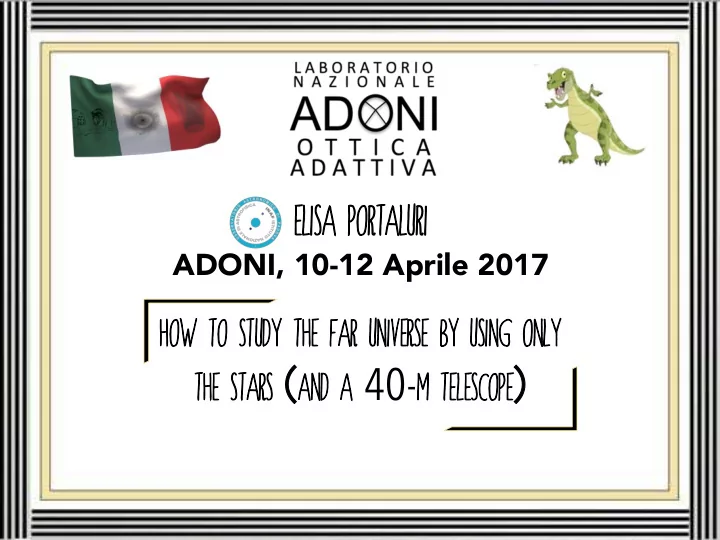

Elisa Portaluri Elisa Portaluri ADONI, 10-12 Aprile 2017 How to study the far Universe BY using only How to study the far Universe BY using only and a 40- m telescope the stars the stars � and a m telescope �
Recipe How to study the far Universe BY using only How to study the far Universe BY using only and a 40- m telescope the stars the stars � and a m telescope � V. Viotto, R. Ragazzoni, M. Gullieuszik, M. Bergomi, D. Greggio, F. Biondi, E. Carolo, S. Chinellato, M. Dima, J. Farinato, D. Magrin, L. Marafatto, U. Umbriaco, and D. Vassallo
the Universe cake the Universe cake � � . ingredients . ingredients � . Steps . Steps � . fills . fills
INGREDIENTS 1) The far Universe
INGREDIENTS 1) The far Universe numerous surveys
INGREDIENTS 1) The far Universe: Irregulars: (n < 0.5) uncovered important pieces of evidence Discs: (0.5 > n > 1.0) Bulges (n > 2.5) Central compact component? (n = 5.0) Smaller - Regulars – Irr Smaller - Regulars – Irregulars - Mer egulars - Merging - Spher ging - Spheroids? - Discs? - oids? - Discs? - No Hubble Seq.? - No No Hubble Seq.? - No λ -dependence -dependence
INGREDIENTS 1) The Far Universe 2) A telescope
INGREDIENTS 1) The Far Universe 2) A telescope Campo di Vista (arcsec) Risoluzione (arcsec px -1 )
INGREDIENTS 1) The Far Universe 2) A telescope: - With an adequate AO system
INGREDIENTS 1) The Far Universe 2) A telescope: - With an adequate AO system
OUR RECIPE: Global-MCAO
OUR RECIPE: Global-MCAO 1) Atmospheric Simulation Tool: - 40 layers (ESO profile) - h max = 25.2 km @zenit - L 0 = 25 m - r 0 = 0.129 m @30°, 500 nm Layers Virtual Viotto et al (2015) Real DMs WFs profile DMs
OUR RECIPE: Global-MCAO 1) Atmospheric Simulation Tool 2) Pointing: - Chandra Deep Field South; RA=3:32:28; DEC=-27:48:30 - Star Catalog: USNO-B, R-band HUDF CANDELS CDF-S GOODS-S GEMS
OUR RECIPE: Global-MCAO 1) Atmospheric Simulation Tool 2) Pointing 3) K-band Strehl Ratio: 500”x500” star-poor field,<SR>=0.17 HUDF CANDELS CDF-S GOODS-S GEMS
OUR RECIPE: Global-MCAO 1) Atmospheric Simulation Tool 2) Pointing 3) K-band Strehl Ratio: PSF construction
OUR RECIPE: Global-MCAO 1) Atmospheric Simulation Tool 2) Pointing 3) K-band Strehl Ratio 4) Simulation of a deep field: - 10 x 10 grid of 50 x 50 arcsec 2 - AETC (Falomo et al. 2011) 1 arcsec - input parameters (van der Wel et al. 2014) log (M/M ¤ ) = 9, 9.3, 9.7, 10, 10.3 z = 0.25, 0.75, 1.25, 1.75, 2.25, 2.75
OUR RECIPE: Global-MCAO Early types Late types
OUR RECIPE: Global-MCAO
THE FINAL PRODUCT 1) SExtractor completeness: 99.7% (ETGs) - 89.4% (LTGs) found not found found, 2x2 bin N N z Log M/M ¤ K-band SR K-band SR
THE FINAL PRODUCT 1) SExtractor completeness: 99.7% (ETGs) - 89.4% (LTGs) 2) GALFIT: Morphology and Photometry - NO PSF a priori knowledge! ETGs LTGs Sérsic index
THE FINAL PRODUCT 1) SExtractor completeness: 99.7% (ETGs) - 89.4% (LTGs) 2) GALFIT: Morphology and Photometry 3) Comparison SR model code ETGs SR * /SR model code
THE FINAL PRODUCT 1) SExtractor completeness: 99.7% (ETGs) - 89.4% (LTGs) 2) GALFIT: Morphology and Photometry 3) Comparison SR model code LTGs SR * /SR model code
A GMCAO-assisted telescope can carry out photometric surveys successfully, recovering the morphology and photometry of sample galaxies adequately WHAT’S NEXT? 1) Feasibility (with GMCAO) of other surveys
A GMCAO-assisted telescope can carry out photometric surveys successfully, recovering the morphology and photometry of sample galaxies adequately WHAT’S NEXT? 1) Feasibility (with GMCAO) of other surveys
A GMCAO-assisted telescope can carry out photometric surveys successfully, recovering the morphology and photometry of sample galaxies adequately WHAT’S NEXT? 1) Feasibility (with GMCAO) of other surveys 2) Any other science cases where NGSs are preferable to LSGs… 3) Other recipes..
Enjoy the cake
Recommend
More recommend